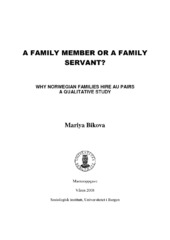| dc.contributor.author | Bikova, Mariya | eng |
| dc.date.accessioned | 2008-07-23T08:10:59Z | |
| dc.date.available | 2008-07-23T08:10:59Z | |
| dc.date.issued | 2008 | eng |
| dc.identifier.uri | https://hdl.handle.net/1956/2739 | |
| dc.description.abstract | The au pair programme is a scheme for cultural exchange that is meant to enable youngpeople experience a new culture and increase their linguistic and professional abilities throughparticipation in a foreign family’s everyday life. In the official discourse the au pairs areconstructed as neither workers nor students, but as ‘guests’ of a ‘host family’ on a temporaryvisit. The au pairs are meant to live as members of a host family and as such they receive freeboard and lodging as well as pocket money. In return the au pairs help with childcare andhousework. The au pair scheme has become very popular in Norway during the last decadeand now an increasing number of Norwegian families hire au pairs. Couples with or withoutchildren – married as well as cohabiting and single parents with children may hire au pairsthrough the au pair scheme. Single persons without children may not use the scheme. Giventhe large availability of high-quality affordable public daycare arrangements for preschoolersas well as for children at school age, the generous parental leave legislation and the familyfriendlinessof the Norwegian labour market, the study asks why an increasing number ofNorwegian families hire au pairs. | en_US |
| dc.language.iso | eng | eng |
| dc.publisher | The University of Bergen | eng |
| dc.title | A Family Member or a Family Servant? Why Norwegian Families Hire Au Pairs. A Qualitative Study. | eng |
| dc.type | Master thesis | en_US |
| dc.rights.holder | The author | en_US |
| dc.rights.holder | Copyright the author. All rights reserved | en_US |
| dc.description.degree | Master i Sosiologi | |
| dc.description.localcode | SOS360 | |
| dc.subject.nsi | VDP::Samfunnsvitenskap: 200::Sosiologi: 220 | nob |
| fs.subjectcode | SOS360 | |
